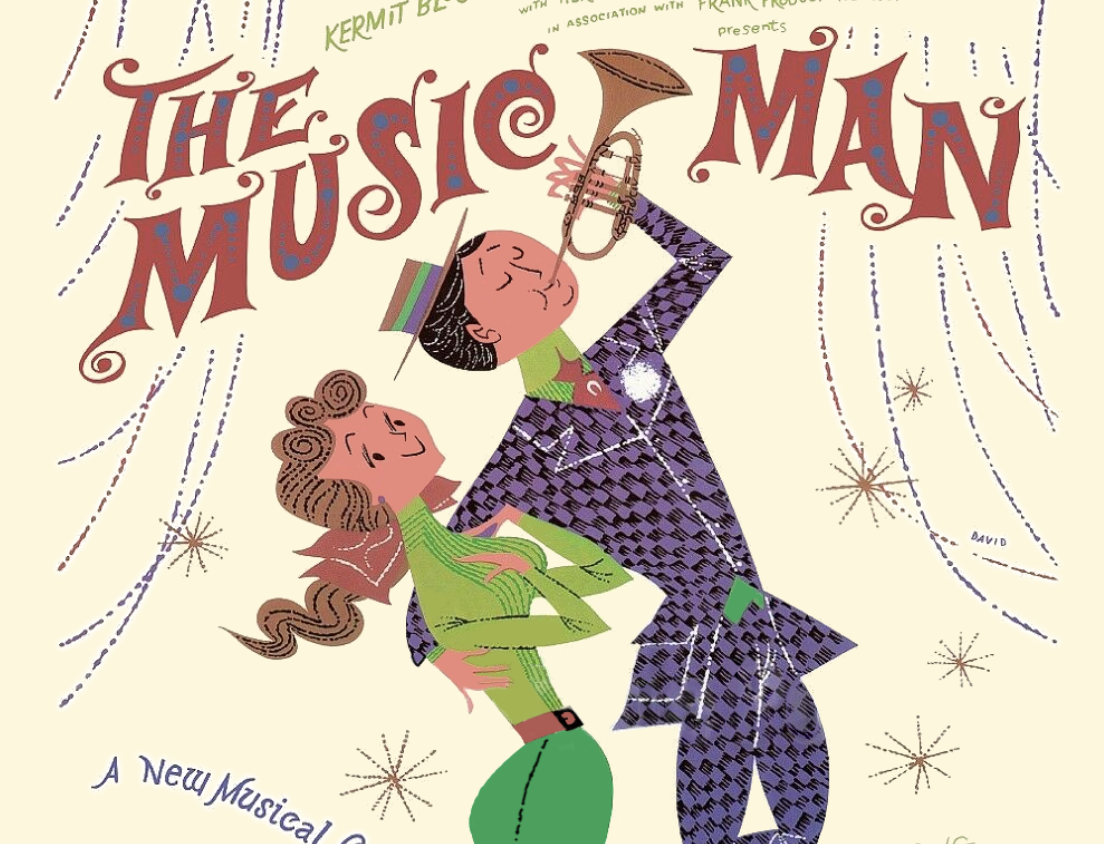When Kirk Boyd signed on to direct The Music Man, which opens Friday, July 7, at The Shedd Institute, he knew right off he’d have a problem with the text of the popular 1957 Broadway musical. The winner of five Tony Awards, including Best Musical, the play tells the tale of con man Harold Hill, his attempt to scam the citizens of the fictional town of River City, Iowa, with an imaginary marching band, and his redemption through romance with Marian the librarian.
Despite its cotton-candy plot, the Meredith Willson classic — think songs like “Till There Was You” and “Seventy-six Trombones” — includes a few cultural clunkers. “There are some really racist things,” Boyd says.
The Shedd has a reputation for trying to present shows as they were originally produced and has been called out for that in the past. But after discussion, Boyd and Jim Ralph, The Shedd’s executive director, agreed that some bits of the script contributed nothing but aggravation and offense, such as one extended stereotypical send-up of Native Americans. “You can excise it very easily with no problem at all,” Boyd says. They did.
Though the version audiences will see in Eugene lacks a few pieces of the original play, Boyd’s interpretation will add emphasis to a subplot involving a minor character, 9-year-old Winthrop Paroo, Marian’s brother. In the 1957 script, Winthrop is a social wallflower, paralyzed by shyness on account of his lisp.
In an early version by Willson of Music Man, then titled The Silver Triangle, the character was named Jim Paroo, had cerebral palsy, used a wheelchair and was much more shunned by the community. When the head of the local school board visits his home and discovers Jim, he chides the boy’s mother: “An imbecile son all these years. These kinds of creatures belong in the asylum, Mrs. Paroo.” As is clear from the original title of the play, the disabled boy was a main character, as the community eventually found an instrument he could play.
Willson was convinced by his producers that a severely disabled child would too easily steal the show from Harold and Marian, and toned the boy’s disability down to a lisp.
The subplot of Winthrop’s lisp is a key part of the show, as Ralph writes in program notes for the production. “The greatest challenge he faced in the creation of The Music Man was that Willson had an ax to grind: how poorly most people in mid-century America treated folks with disabilities. At best people misunderstood; at worst they were actively hostile; and more often than not folks with every kind of disability wound up isolated from community life, if not because of their particular physical, mental or emotional disability, then because they were sanctioned, denied access to school and work, or simply institutionalized.”
Music Man is, at its heart, a play about a community coming together, overcoming differences and finding a kind of enlightenment. Boyd says his production will illustrate this visually by a shift from sepia-toned costumes and lighting to brighter and brighter colors onstage.
Playing Winthrop will be Eliyah Chandler, who was Gretl von Trapp in The Shedd’s 2022 production of The Sound of Music.
“She can belt,” Boyd says of the young actor’s voice. “Gosh, can she belt!”
Harold Hill will be played by Tate Forshay, and Marian will be played by Cyra Conforth, a regular in Shedd musicals for the past decade. She and her younger sisters, Kenady and Campbell, were in the children’s ensemble in a 2013 production of The Music Man directed by Ron Daum at The Shedd. Their mother, Ashley Chandler, plays Mrs. Paroo.
Robert Ashens is music director and conductor, Laura Sue Hiszczynskyj is choreographer, Anna Björnsdotter is costume designer and Jim Ralph is set designer.
The Music Man opens 7:30 pm Friday, July 7, and runs weekends through Sunday, July 23, in The Shedd’s Jaqua Concert Hall. Tickets are $29 to $39, with discounts available, at TheShedd.org or 541-434-7000.
A Note From the Publisher

Dear Readers,
The last two years have been some of the hardest in Eugene Weekly’s 43 years. There were moments when keeping the paper alive felt uncertain. And yet, here we are — still publishing, still investigating, still showing up every week.
That’s because of you!
Not just because of financial support (though that matters enormously), but because of the emails, notes, conversations, encouragement and ideas you shared along the way. You reminded us why this paper exists and who it’s for.
Listening to readers has always been at the heart of Eugene Weekly. This year, that meant launching our popular weekly Activist Alert column, after many of you told us there was no single, reliable place to find information about rallies, meetings and ways to get involved. You asked. We responded.
We’ve also continued to deepen the coverage that sets Eugene Weekly apart, including our in-depth reporting on local real estate development through Bricks & Mortar — digging into what’s being built, who’s behind it and how those decisions shape our community.
And, of course, we’ve continued to bring you the stories and features many of you depend on: investigations and local government reporting, arts and culture coverage, sudoku and crossword puzzles, Savage Love, and our extensive community events calendar. We feature award-winning stories by University of Oregon student reporters getting real world journalism experience. All free. In print and online.
None of this happens by accident. It happens because readers step up and say: this matters.
As we head into a new year, please consider supporting Eugene Weekly if you’re able. Every dollar helps keep us digging, questioning, celebrating — and yes, occasionally annoying exactly the right people. We consider that a public service.
Thank you for standing with us!

Publisher
Eugene Weekly
P.S. If you’d like to talk about supporting EW, I’d love to hear from you!
jody@eugeneweekly.com
(541) 484-0519
